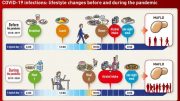A study found that people who drink coffee have a lower chance of getting kidney damage quickly
If you need another incentive to start your day with a cup of Joe, a recent study conducted by Johns Hopkins Medicine researchers found that drinking at least one cup of coffee per day may lower the risk of acute kidney injury (AKI) as compared to those who do not.
The findings, which were published in the journal Kidney International Reports on May 5, show that those who drank any amount of coffee per day had a 15% lower risk of AKI, with the greatest reductions seen in those who consumed two to three cups per day (a 22 percent–23 percent lower risk).
“We already know that drinking coffee on a regular basis can help prevent chronic and degenerative diseases like type 2 diabetes, cardiovascular disease, and liver disease,” says Chirag Parikh, M.D., Ph.D., director of the Division of Nephrology and professor of medicine at Johns Hopkins University School of Medicine. “We can now add a possible lower risk of AKI to the long list of health benefits of caffeine.”
According to the National Kidney Foundation, acute kidney injury (AKI) is defined as a “sudden episode of kidney failure or kidney damage that occurs within a few hours or days,” This causes waste products to build up in the blood, making it difficult for the kidneys to maintain the proper fluid balance in the body.
Depending on the etiology, AKI symptoms may include: insufficient urine output; swelling in the legs and ankles, as well as around the eyes; weariness; shortness of breath; confusion; nausea; chest discomfort; and, in severe cases, seizures or coma.
Most people who have this condition are in the hospital and have kidneys that have been hurt by medical or surgical stress or complications.
Researchers evaluated 14,207 adults with a median age of 54 who were recruited between 1987 and 1989 for the Atherosclerosis Risk in Cities Study, an ongoing investigation of cardiovascular disease in four U.S. communities.
Over the course of a 24-year period, participants were asked how many 8-ounce cups of coffee they consumed per day: zero, one, two to three, or more than three. During the time of the study, there were a total of 1,694 cases of acute kidney damage.
When demographic variables, socioeconomic level, lifestyle influences, and dietary factors were taken into account, participants who consumed any amount of coffee had a 15% reduced risk of AKI than those who did not.
Even after accounting for other comorbidities such as blood pressure, body mass index (BMI), diabetes status, antihypertensive medication use, and kidney function, people who drank coffee had an 11% lower risk of having AKI than those who did not.
“We believe that coffee’s effect on AKI risk is due to either physiologically active chemicals coupled with caffeine or caffeine itself improving perfusion and oxygen consumption within the kidneys,” Parikh explains.
“Constant blood flow and oxygen are required for good kidney function and tolerance to AKI.”
More research is needed, according to Parikh, to determine the potential protective mechanisms of coffee consumption for the kidneys, particularly at the cellular level.
“Caffeine is thought to suppress the development of chemicals that cause chemical imbalances and excessive oxygen utilization in the kidneys,” he explains. “Perhaps caffeine aids in the maintenance of a more steady system by the kidneys.”
Coffee additives such as milk, half-and-half, creamer, sugar, or sweeteners, according to Parikh and his colleagues, may also increase AKI risks and need more investigation. According to the authors, consumption of other caffeinated beverages, such as tea or soda, should also be regarded as a possible confounding factor.





